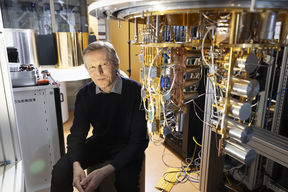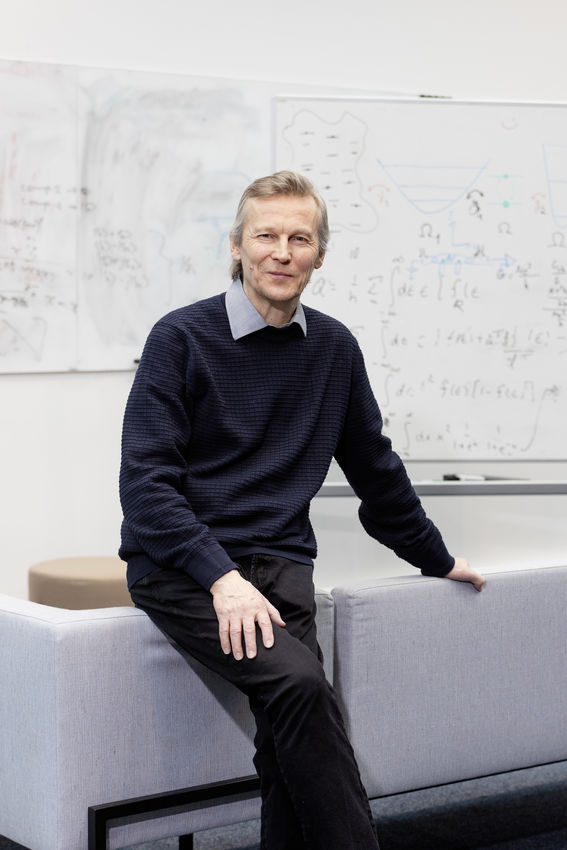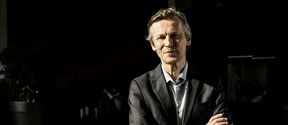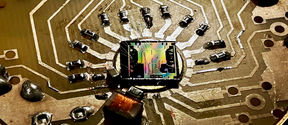Aalto University to coordinate Finnish quantum initiatives in latest national flagship programme
The flagship unites dozens of research institutions, companies, and startups in new collaborative front

We have a good starting point for quantum research in Finland. The Low Temperature Laboratory, ultra-low temperature technology and superconducting devices have been on the agenda for more than 50 years. Olli V. Lounasmaa, the founder of the Low Temperature Laboratory, was a pioneer in terms of science policy and strategy, and he understood the importance of internationalisation. He also realised that Finland is a small high-tech country, so it is important to find our own areas of expertise. He also created an international community of researchers in experimental low temperature physics in Finland. The openness and mobility of researchers were the keys to success.
In recent decades, macroscopic systems, i.e., man-made devices that operate quantum mechanically and can generate quantum superpositions and entangled states, have been developed worldwide. They also preserve quantum states long enough to be exploited in demanding experiments and devices. In 1999, the first superconducting quantum bit was successfully built with a lifetime of about one nanosecond. Today, the lifetime of these basic quantum elements is at best in the order of a millisecond, which is a million-fold improvement.
It is not so many decades ago since quantum phenomena were thought to be observable only in the atomic world. It was only in the 1980s and 1990s when it was discovered that it is possible for humans to make quantum devices. Since then, the scale of these devices have gone from the atomically small to the millimetre or centimetre scale. Physicists and philosophers often wonder whether there is a limit to how much scale can be increased.

For 40 years, my scientific love has been quantum thermodynamics, which combines quantum physics and thermodynamics – how temperature is determined in a quantum system and how heat is transported in it. A quantum system is inherently open, i.e., it is coupled to the environment, but what is temperature, and what determines it? Technological advances have gradually made it possible to carry out more and more precise experimental research, so that these questions can now be better studied in more precisely tailored systems.
We have a great community in Finland that has moved the quantum field forward in a collaborative way. Our idea is to bring together fundamental researchers and practitioners from different fields. It's a broad community, and yet we can speak the same language. In the course of National Centres of Excellence, significant industries have emerged in this field, such as Bluefors and IQM. On the other hand, quantum is still in its infancy compared to many other fields.
I feel that basic research is the only sensible way to get something long-term and effective done. Recently, we have also started to develop quantum education, and now we have, for example, new PhD positions in the field from many directions. I would like to see a student community grow into a driving force for the quantum ecosystem.
We have a lot of young international researchers and students in this field, and it would be really important not to put any unnecessary restrictions on their working conditions and residence permits. Otherwise, the development of quantum technologies and research will be jeopardised. Many of them are already wondering today whether Finland is a good place to be in the future.
Otherwise, Finland is doing well in this field because people know each other. We are able to pull together. The Finnish quantum institute, InstituteQ, will be expanding to cover the whole country, and the national flagship project that has just started involves a wide range of actors from different institutes.
We have wanted the institute to represent quantum science and technology broadly in Finland. This is why we have researchers from a wide range of disciplines, including quantum philosophers. This challenges researchers to look outside their comfort zone. Students and young researchers will be able to see that the research field includes things that are not feasible in their own labs. I also try to tackle philosophical questions in my own research, but in a mathematical and technical way.
Quantum technology is currently going through a hype phase, typical of new fields, with great promise and expectation. The voice of individual researchers – especially sceptics – is not necessarily heard. That is the danger. If a sector becomes a megatrend, the concrete pillars of research and technology can easily be left behind. This is why a multi-voiced debate is also needed outside the scientific community.
In the field of quantum sensors, practical consumer products can be developed rapidly. Based on quantum coherent phenomena, sensors measure various environmental parameters such as magnetic fields, motion, radiation or even temperature. The development timetable for the great challenge and promise of quantum technology – the quantum computer – is not something I want to predict here.
Quantum mechanics fascinates people, and it pops up in many contexts. People are wondering how it will affect their lives in the future. Quantum is of interest way beyond scientists or the science fiction world.
Quantum science and technology are based on very concrete mathematical structures and experimental facts. To make something plausible – unless you want to make a complete fiction – you need to talk to scientists in the field. Otherwise, things can get out of hand. But culture and art also have the freedom to cross boundaries. In Finland, too, there is a lot of cross-pollination in the field of science, art, and culture, for example by some researchers at InstituteQ.
Read the media release: Finnish Cultural Foundation awards granted to Villu Jaanisoo, Heini Junkkaala ja Jukka Pekola

The flagship unites dozens of research institutions, companies, and startups in new collaborative front

Professor Pekola will lead the Institute as it starts its operations

InstituteQ coordinates quantum technology research, education and innovation across Finland



